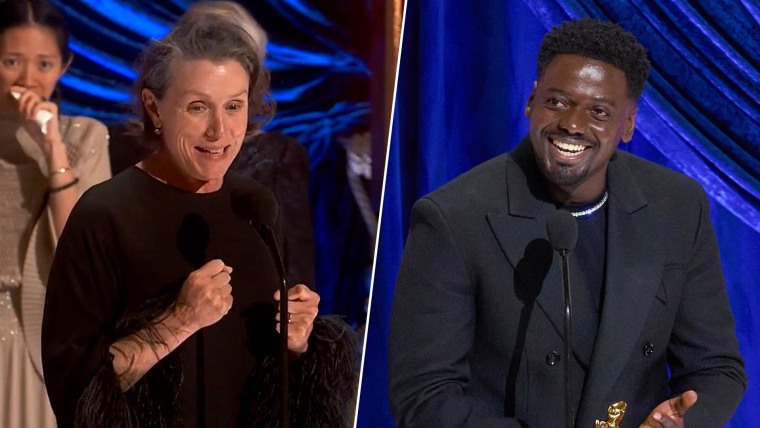On Sunday night, as on so many nights before, the Academy Awards gave a standing ovation to standing in the middle. They did this both literally, when director and entertainment mogul Tyler Perry dedicated his Jean Hersholt Humanitarian Award to anyone willing to “reject hate” and “stand in the middle” with him, and they did it figuratively by delivering a ceremony that mixed self-satisfaction with sincere (if shallow) good intentions; that mixed galvanizing victories with baffling snubs — most notably of Chadwick Boseman — to such a degree that every viewer, whatever their rooting interests in art or politics, was guaranteed to leave the telecast unsatisfied.
What stings is the disappointment of seeing such a familiar story recognized while three novel ones, each given life by performances strong enough to merit the award, were overlooked.
In theory, standing in the middle — where, as Perry put it, “conversation happens” — sounds great. When dealing with issues of systemic racism, however, the model is lacking. If one side is denying the humanity of the other, and that conditional understanding of humanity is built into the laws and culture of our country, the middle is still going to be a good ways short of anything resembling justice.
Moreover, in practice — at least where Hollywood is concerned — standing in the middle usually means never carrying your convictions far enough to create meaningful change. Such as at this year’s Academy Awards, which featured the most diverse slate of contenders to date and where both the nominations and the wins contained many key “firsts”: the first time multiple women were nominated for best director, the first time a woman of color (Chloe Zhao for “Nomadland”) won, the first Asian American and the first Muslim actor nominated for best actor (Steven Yuen and Riz Ahmed, respectively). And still the night managed to end with an unforced error so glaring that it squandered all the goodwilll these changes might otherwise have garnered.
The organizers inexplicably shuffled the order of the awards so that best picture — the final award of the night in every broadcast but one from 1948-2020— was announced third from last, leaving best actor in a leading role to close the night. Unsettled by the change, many speculated that it was done to create a fitting showcase for Boseman, an actor of colossal talent who died much too young from colon cancer last year and whose win for his performance in “Ma Rainey’s Black Bottom” was considered all but guaranteed.
Instead, the statuette was awarded to Anthony Hopkins, the only living nominee not in attendance, leaving the show to end so abruptly that it called to mind a laptop blinking out from a lack of power. The British octogenarian’s second win, sans a speech, blocked not just Boseman’s only chance at receiving the academy’s highest acting recognition, but also the potential for the long-overdue progress in Asian and Muslim representation that either Yuen’s or Ahmed’s victories would have realized. Hopkins’ upset would have felt like an aggravating bait-and-switch wherever it fell in the ceremony.
On Monday morning, Hopkins released a belated acceptance speech in which he explained that his absence was due to his age and the entirely unexpected nature of the honor, gracefully acknowledging Boseman in his remarks. Hopkins’ performance in “The Father” is much praised, and deservedly so. What stings is the disappointment of seeing such a familiar story recognized while three novel ones, each given life by performances strong enough to merit the award, were overlooked.
By serving as the show’s dramatic close, Hopkins’ win colored the takeaway for the whole ceremony. It forced viewers hungry for meaningful change in Hollywood to recall that an organization that has awarded nearly a quarter of its 92 prior best actor statuettes to white British men without deeming one Asian or Muslim performance worthy of nominating was unlikely to be the change they wished to see. With a track record so weak, you need to aim for something a little more radical than “standing in the middle” to remain relevant and respected in a rapidly changing world.
One way the academy and its elite Hollywood members might accomplish that meaningful change is by abandoning their practice of what Charles Dickens’ satirically called “telescopic philanthropy”: lavishing attention on causes well outside their purview in a self-aggrandizing manner while remaining silent about glaring issues in their own field.
Throughout the night, many references were made to the challenges of our present political moment. Those within winners’ speeches could be moving and heartfelt, such as the anti-police violence and anti-gun sentiments voiced in the acceptance speeches from the teams behind “Two Distant Strangers” (best live action short) and “If Anything Happens I Love You” (best animated short).
But those scripted into the ceremony felt exceptionally tone-deaf. None was more shamefully so than the actor Marlee Matlin’s mention of Darnella Frazier in her introduction of the category of best documentary feature, where she cited the Black teenager’s video capturing then-Minneapolis Police Officer Derek Chauvin kneeling on George Floyd’s neck as an example of the power documentary film can wield. While Frazier is absolutely deserving of recognition, this tribute brings nothing meaningful to the fight against racial oppression that her video galvanized. The gesture implies that, in the eyes of the academy, merely mentioning her video was an honor. But to the eyes of anyone else, it is quite the opposite.
The mention steals the valor of Frazier’s world-changing act and drapes it over five unrelated documentary projects, all the while ignoring a glaring truth: Should Frazier, or any young Black woman, take this mention as encouragement and pursue a career as a director, she would have little hope of receiving true academy recognition when the organization has yet to find a Black woman’s directorial efforts worthy of even a nomination, let alone an award.
She would also be working in an industry that, while happy to applaud itself for recognizing wrongs in the wider world, remains markedly silent on the culture of abuse that permeates every level of its community — a place where someone like Scott Rudin can garner nine nominations and one win but escape critique for decades of allegedly virulently cruel treatment of his staff, even after victims have recently stepped forward to describe their allegations in great detail. (Rudin has described some of those details as “exaggerations.”)With abusers ranging from Rudin to convicted rapist Harvey Weinstein on one side, a blind eye seems necessary for even a stance in the middle to be comfortable.
In the end, the night’s most important victory wasn’t accompanied by the awarding of a statuette. Instead, it was a moment shared by two historically snubbed entities.
In the end, the night’s most important victory wasn’t accompanied by the awarding of a statuette. Instead, it was a moment shared by two historically snubbed entities: Glenn Close, who has been nominated for her acting eight times without winning, and D.C. go-go band Experience Unlimited, whose immortal hit “Da Butt” was overlooked in its year of eligibility (1988, when it was written for Spike Lee’s “School Daze”). Both finally received their due Sunday, when a shaggy bit about Oscar-nominated song trivia resulted in Close both reciting an unexpectedly detailed history of the song and then, iconically, performing the butt-gyrating dance the song describes.
It was a long, strange and ultimately disappointing night but, to paraphrase Humphrey Bogart, we’ll always have Glenn’s ass.
Source: | This article originally belongs to Nbcnews.com











